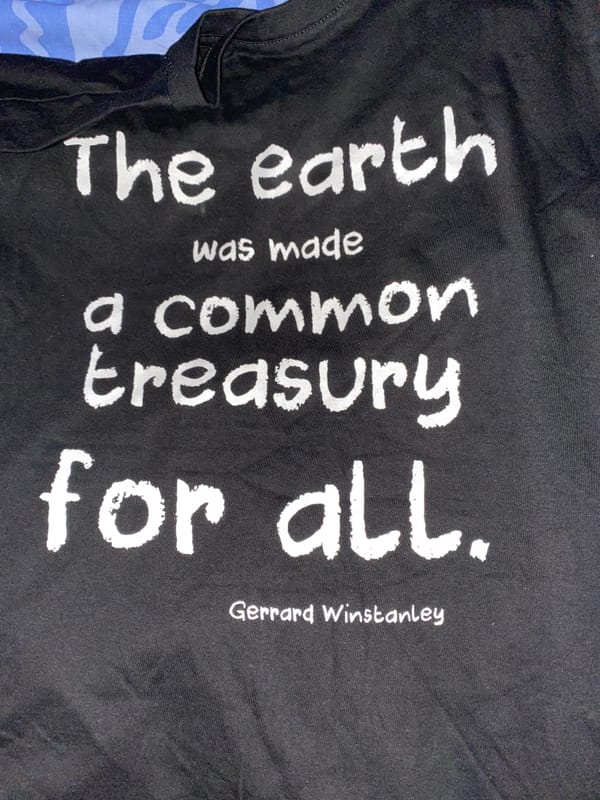Capitalism as dreamtime
Time to wake up

We are held transfixed in a destructive dream that our owners have created for us. On the surface it isn't so bad, but that's because the substantive problems we face are never discussed. Environmental destruction, work that is physically and mentally debilitating, work that is meaningless, all these things can take a terrible toll on you as a human being but they never rise to the surface of our collective minds.
If you look at the mass media in the UK pretending that the majority of people care about the new king you can see how much effort goes into manufacturing the supposed consensus.
There's a dreamlike quality to a lot of the news one reads. Once you realise it's there to support a particular world view that's happy with the forced extraction of resources from far away lands, the normalising of proxy wars that make money for our owners, and ignoring the real human suffering and death that comes directly from government policies, it starts to seem very odd, as if one is expected to live in a dream all the time, or act like you are in some kind of drugged stupor.
In their creation myths the Aboriginal Australian talk about dreamtime, which is when the various beings that created the world wandered across it and dreamed it into existence. Once dreamed the world became what it is. We have a process where news and media outlets pour out these dreams and tell us how we should see the world which is far less sweet, and not connected to the realities of the land we live in at all. Remembering the dreaming was a way of navigating through the world, it gave the Australians a map that told them where to find each other and the resources they needed to survive. The dreaming for us is instead to keep us quiet and deluded about the realities we have to live with, but it still seems as if it has always existed. Everything is seen through the lens of modern capitalist mores and considerations, even when this makes no sense because it doesn't connect with the reality you see around you.
In a recent podcast the Marxist historian and commentator David Harvey makes the point that after 40 years of neoliberal individualism when people in the USA are asked questions like what do you think of Joe Biden a great many respond with he hasn't done anything for me. Back in the 1970s people would have commented on how policies had helped others, the poor, improved education, etc. in a wider context. These long years of isolation and damage to institutions and modes of thinking that support collective thinking and acting have changed the mental landscape, or habitus, of most of us and we didn't notice it happening.
The long retrenchment of the ruling class has made it hard to see that we are debating on their terms. All their nonsense about markets and small government seeming to be the way things should be done for the last few decades is a relatively new idea, at least in the mainstream. When we were told there is no alternative it means there is no alternative if you accept the world they have manufactured and force the rest of us to live in. Before the neoliberal takeover in the 1970s people thought quite differently and the debate was framed very differently. Make no mistake, the consensus is violent and hurting us all. The violence is slow, but nevertheless harmful.
To re-quote Marx in The German Ideology or here
The individuals composing the ruling class possess among other things consciousness, and therefore think. Insofar, therefore, as they rule as a class and determine the extent and compass of an epoch, it is self-evident that they do this in its whole range, hence among other things rule also as thinkers, as producers of ideas, and regulate the production and distribution of the ideas of their age: thus their ideas are the ruling ideas of the epoch.
This is how they control us without us necessarily being obviously coerced. It becomes hard to even discuss how things should be done differently if the basis of the ideas we need seems far away and utterly different to the way we've been conditioned to think. When Herman and Chomsky wrote Manufacturing Consent it wasn't so much that ideas are suppressed or censored but more that they can't even be discussed because they don't appear in people's minds to be discussed. This is one of the themes in Orwell's 1984, but it is way more sophisticated than he thought it would be.
Like the physicist Richard Feynman said nature cannot be fooled. Despite the claim that everything is fine we have all the unnecessary suffering in the world caused by the normalisation of capitalist robbery. Despite the bemused expression on our owners’ faces and the claim that this suffering is like the weather and can't be controlled or eliminated, it can be. We have had years where wages have been suppressed using mechanisms like inflation and suddenly it's jumped so high that instead of not finding it in ourselves to fight over an effective 1% pay cut it's now going to be 15%. People are beginning to see behind the consensus and withdraw their consent.
We need to understand that when we say a better world is possible (in my case I often say a better world is necessary) it will be a world where we think and act very differently. It won't be about what systems do for each of us, but how caring for all of us includes each of us. The systems will be our systems, the thinking will not be shaped by their need to keep us alone and hungry.




